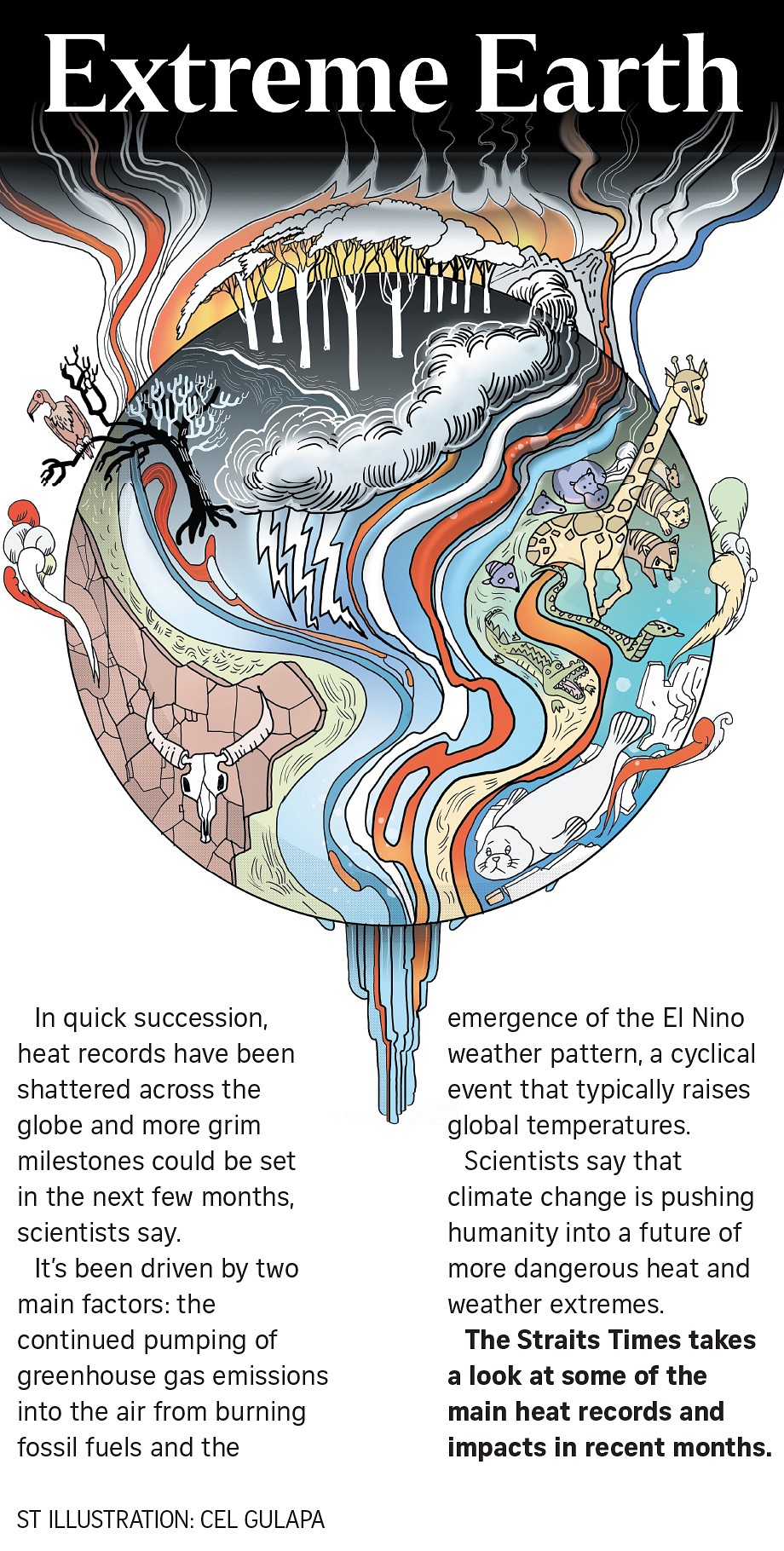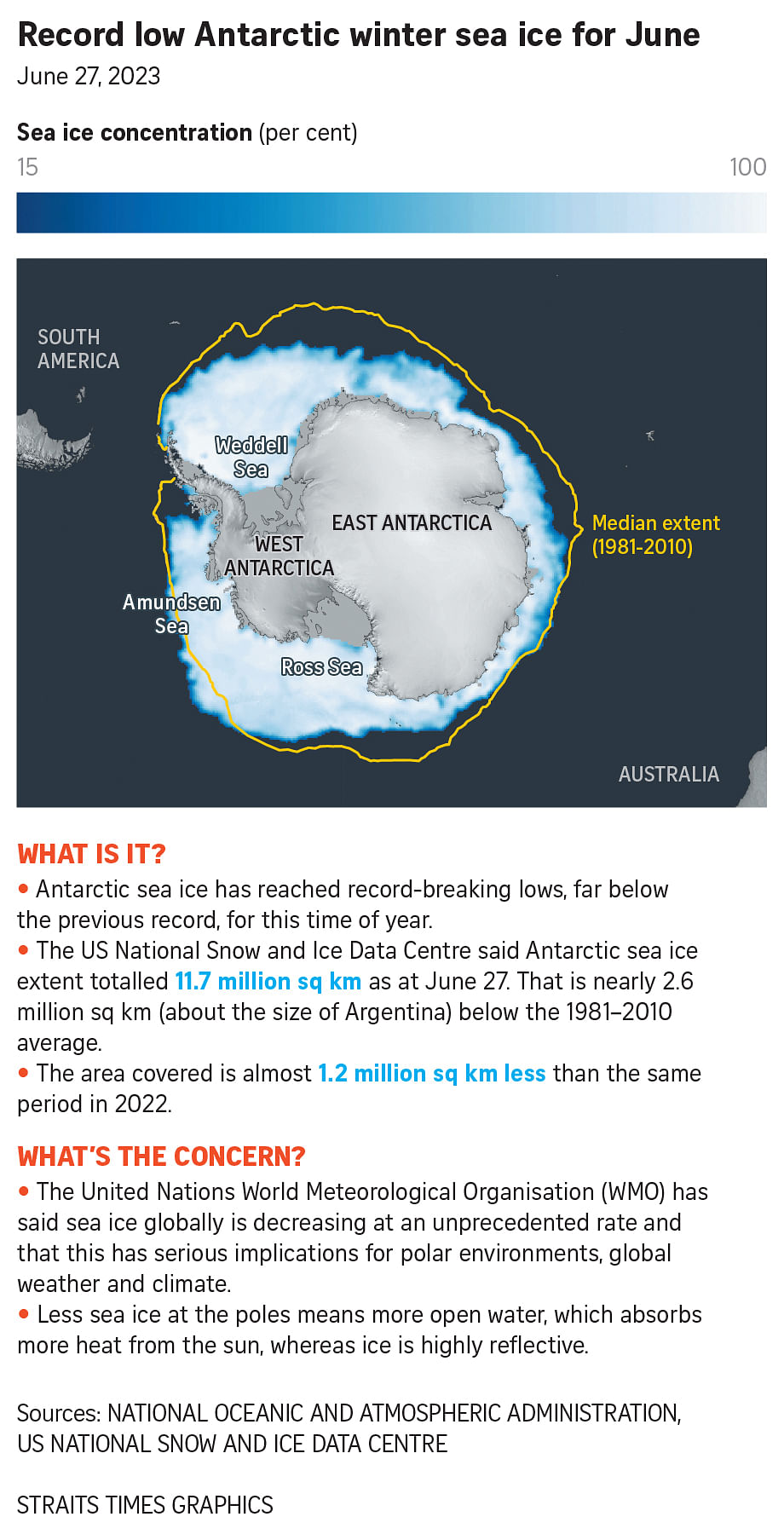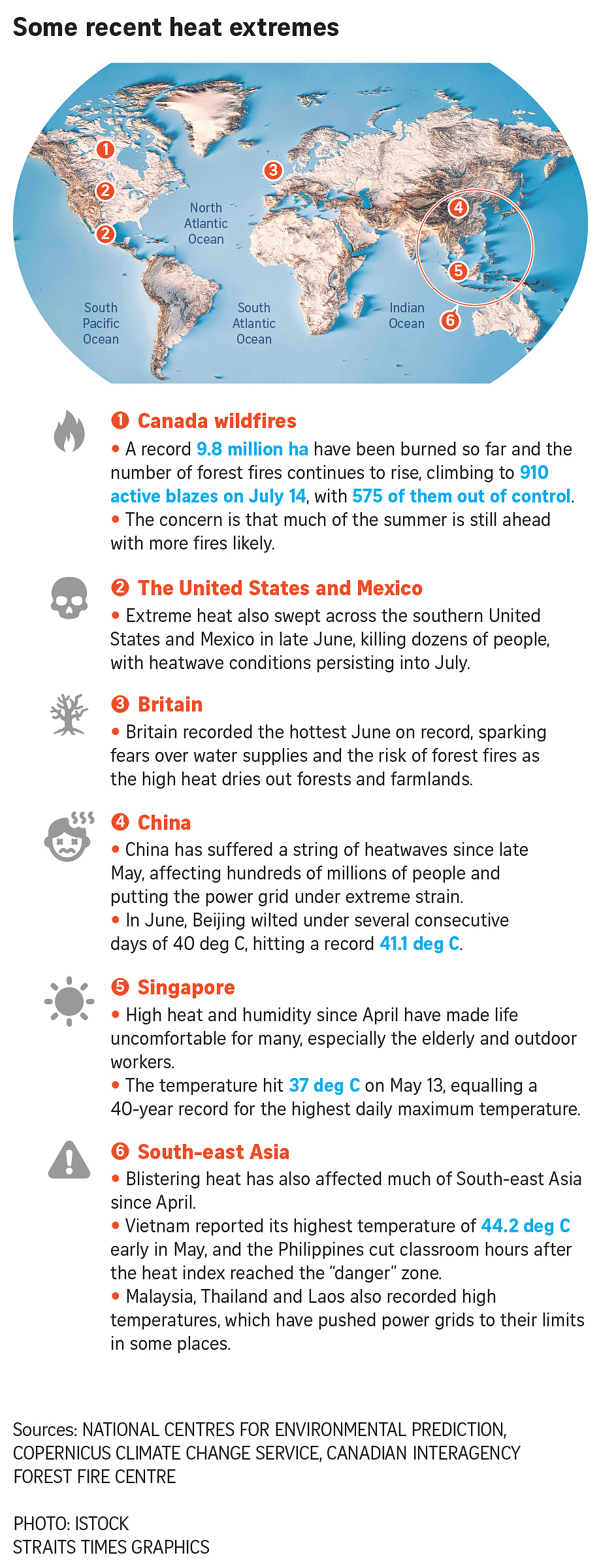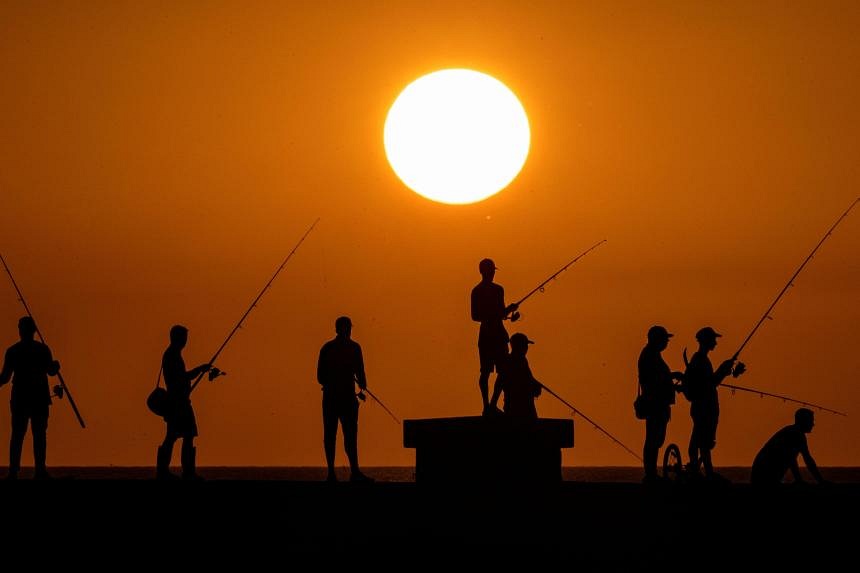SINGAPORE - Climate records have been tumbling at an alarming rate in recent weeks, and that is making people worried. Has climate change kicked up a gear? Is the planet going to boil?
From the hottest week on record, the hottest June on record, the highest average sea surface temperature, to the lowest Antarctic sea ice extent for June, and now floods smashing parts of Japan, India and the United States.
What is going on?
The Straits Times asks climate scientists for their take.
Are we on a runaway train?
The United Nations secretary-general, Mr Antonio Guterres, said “climate change is out of control” after data showed the first week of July was the hottest week on record.
Is he right?
Associate professor of urban climate at Singapore Management University Winston Chow said: “I don’t think it is out of control – yet. We can control and reduce future risks of heat and from other climate impacts if greenhouse gas emissions are reduced globally and action is taken to adapt to these impacts, especially in vulnerable areas.”
But, as at right now, we are on a very unsafe trajectory.
Melbourne University professor of environment, climate and global health Kathryn Bowen said: “Without urgent and accelerated action, we will experience continual record-breaking events, whether these are heat records, drought records or accelerated sea ice loss.”
Is what we are experiencing unexpected?
Climate scientists say no.
“It is not surprising that we are seeing records break,” said Professor Mark Howden, director of the Institute for Climate, Energy & Disaster Solutions at The Australian National University in Canberra. “The thing that is surprising is that some of these things are happening faster and harder than we anticipated from a scientific point of view.”
He added: “The underlying drivers for change have not abated. So, that is our high levels of greenhouse gas emissions. And while that remains the case, we are going to enter, continuingly, record territory, and these are not only individual occurrences, but groups of occurrences – multiple things happening – are likely to increase in the future.”
Prof Bowen concurred: “What we are seeing is what we unfortunately expect, given what the research is telling us, and has told us for decades now.”
She said a substantial amount of climate change is “locked in the system” due to earlier delays in nations committing to strong greenhouse gas reduction commitments.
Why are so many heat records being broken?
Scientists said current El Nino conditions have an additive effect to underlying climate change, pushing temperatures to record highs.
Plus, there has been a reduction in aerosols, which are small particles that can deflect incoming solar radiation.
For instance, rules imposed from 2020 to reduce air pollution from shipping imposed strict limits on the sulphur content of marine fuels.
The decline in sulphur particles contained in ships’ exhaust fumes is now thought to have given global warming a slight boost because more of the sun’s heat is reaching the planet’s surface.
These two factors are most likely to blame for the record-breaking heat, in the atmosphere and in the oceans, said Ms Kimberley Reid, postdoctoral research fellow in atmospheric sciences at Monash University in Melbourne, in a commentary for The Conversation news site on July 6.
Dr Kevin Trenberth, distinguished scholar at the National Centre for Atmospheric Research in Colorado, explained that it is also a matter of timing.
Writing in The Conversation on July 11, he said global mean surface temperature does not continue relentlessly upwards.
The biggest increases, and warmest years, tend to happen in the latter stages of an El Nino event.
The previous big jump in global mean temperatures occurred during the last major El Nino in 2015-16.
Human-induced climate change is relentless and largely predictable.
“But at any time, and especially locally, it can be masked by weather events and natural variability on inter-annual or decadal time scales,” Dr Trenberth said, referring to time scales of a few years to decades.
“The combination of decadal variability and the warming trend from rising greenhouse gas emissions makes the temperature record look more like a rising staircase, rather than a steady climb,” he added.
But why now?
Global land surface temperatures usually hit a peak during the Northern Hemisphere summer simply because there is more land in the northern half of the planet. Land heats up faster than water.
“As land temperature variations are much larger, the highest global mean surface temperatures occur about July,” Dr Trenberth wrote.
For oceans, the timing is different.
As the largest expanse of oceans is in the Southern Hemisphere, which experiences winter from June to August, the highest values for sea surface temperatures occur in March, at the end of southern summer, said Dr Trenberth.
And this fits with the record sea surface temperatures that occurred in April, and which remain high until now.
Joining the dots
“It is really important to join the dots on these events, rather than treating them as separate items,” said Prof Howden.
Combined, they can create much greater threats to human health, even the risk of triggering the failure of crops in key growing areas at the same time.
“What we are seeing are studies looking at complex risk, that is the co-occurrence of risk or cascading risks,” he said.
“As an example of that, when we look at hot years in Australia, it is a combination.
“It is not just the risks of heat stress, but it is the risks of heat stress, plus drought, plus fire, plus smoke.”
What does all this mean for COP28?
“There is already significant pressure on parties from a multitude of fronts,” said Prof Chow.
The United Nations COP28 climate talks will be hosted by the United Arab Emirates at the end of 2023.
Prof Chow said heat records, human and financial costs from related climate extremes such as fires and floods, could pile on pressure for accelerated action in Dubai that goes beyond just phasing out fossil fuels.
He added: “That pressure urgently needs a release valve – which party will take the lead to trigger that valve?”
Prof Bowen said COP28 needs to secure a liveable future for humanity.
“COP28 is vital to see the ramping up of commitments for an urgent phase-out of coal, oil and gas if we want to see a liveable planet for our children and our grandchildren.”
Is the future hopeless?
Scientists say no.
“The future is ours to choose. We can choose wisely, or we can choose unwisely,” said Prof Howden.






- Mutton
-

 1
1



Recommended Comments
There are no comments to display.
Join the conversation
You can post now and register later. If you have an account, sign in now to post with your account.
Note: Your post will require moderator approval before it will be visible.